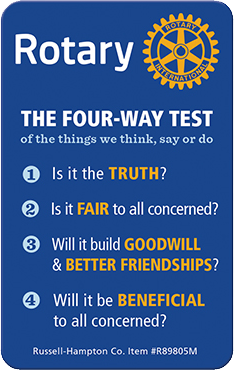In a world full of noise, fear, and fast-talking sales pitches, what is the single greatest asset you can possess? It’s not your database size. It’s not your market share. It is unwavering, undeniable integrity.
For nearly a century, the Rotary Four-Way Test has been the standard of ethical conduct. It was originally created in 1932 by Rotarian Herbert J. Taylor to save a company facing bankruptcy by resetting its moral compass. It worked. It can work for you.
The Test is simple – just 24 words – but its depth will force you to examine every thought, word, and action. If you want to achieve success that lasts, you must measure yourself against these four questions.
1. Is it the TRUTH?
In a business where information is currency, truth is the bedrock of trust. This isn’t about avoiding a lie; it’s about eliminating even the slightest exaggeration or omission.
- Are you presenting market data accurately, or are you cherry-picking stats to make a sale?
- Are you fully disclosing a property’s known defects, even if it complicates the transaction?
- Are your advertisements truthful, or are they relying on hype and vague superlatives?
If you have to pause for longer than a second to answer, you’re not operating with the integrity required for long-term survival. Trust is built with truthful actions; it is destroyed with a single deceit.
2. Is it FAIR to all concerned?
This is where many professionals trip up. Fairness is not about winning the negotiation; it’s about achieving an outcome that respects the interests of every party at the table—your client, the co-op agent, the buyer, the seller, and the vendors.
- Are you pushing a client toward a decision that benefits your commission more than their bottom line?
- In a multiple-offer scenario, are you managing the process with transparency, even when under pressure?
- Are you respecting the time and effort of your competition, or trying to gain an unfair advantage?
Fairness is the difference between a one-time transaction and a lifelong referral. When you act fairly, you turn competitors into collaborators and clients into advocates.
3. Will it build GOODWILL and BETTER FRIENDSHIPS?
Professional life is relational. This question forces you to check the intent and tone behind your actions. A sharp business mind is valuable, but a mind that operates with malice, arrogance, or cynicism is an anchor.
- Are you communicating with colleagues and clients in a way that fosters respect, even when delivering bad news?
- Are you making a public comment that tears down a competitor, or one that elevates the industry standard?
- Does your overall business presence create a feeling of respect and trust in the community?
Goodwill is your brand’s equity. It’s the invisible asset that brings repeat business and attracts the kind of high-quality people you want to work with. If your win comes at the cost of another person’s respect, you didn’t really win.
4. Will it be BENEFICIAL to all concerned?
The final question elevates your thinking beyond self-interest and immediate profit. It asks you to consider the long-term positive impact on the client, the community, and the industry as a whole.
- Is the advice you’re giving sustainable for the client’s financial future, or just expedient for a quick close?
- Does your success contribute positively to the perception of your entire profession?
- Are you just solving today’s problem, or are you helping set up a long-term solution that benefits everyone involved?
The most successful people don’t chase money; they pursue value that creates a tidal wave of benefit for others. When your focus is on the benefit of all concerned, you align your personal success with universal good.
The 4-Way Test is not a feel-good mantra for Sunday morning; it is a practical checklist for Monday morning. Every time you open your mouth, send an email, or make a decision, run it through the test.
If you can’t answer “Yes” to all four, don’t think it, don’t say it, and definitely don’t do it. Your reputation is all you have. Protect it fiercely.
